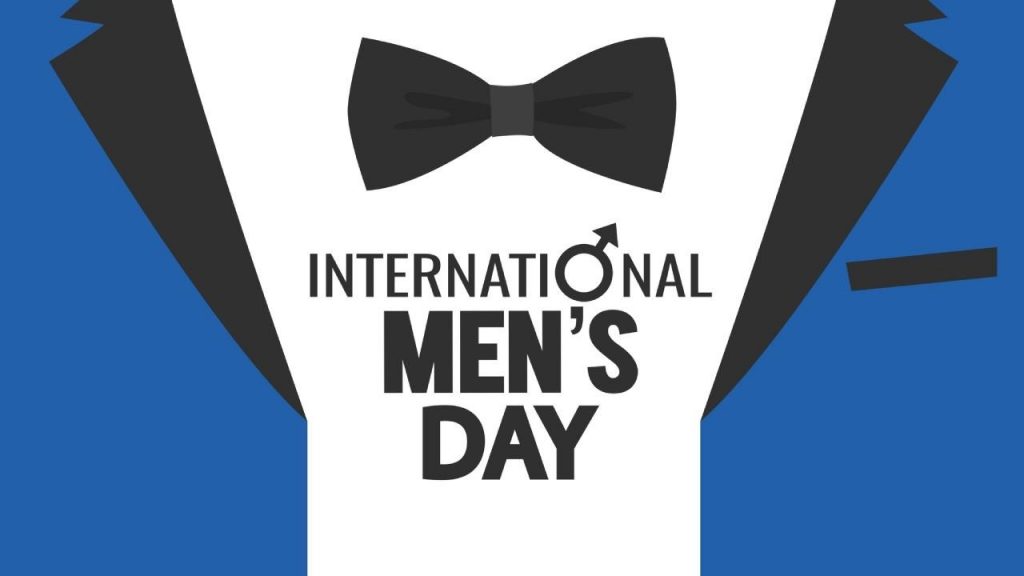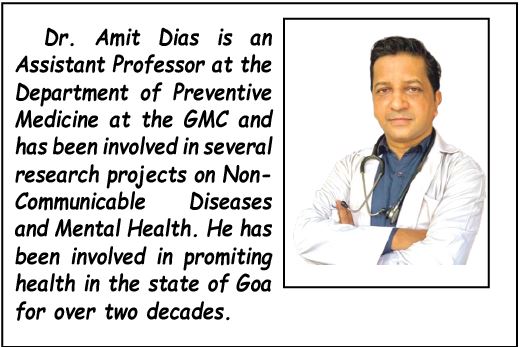Goa is abuzz with excitement as vintage bike and car owners, users, collectors and fans are decking […]

LET’S TALK ABOUT MEN’S HEALTH!
MIND & BODY, HEART & SOUL, Nov 25- Dec 01 2023 November 24, 2023Do you know that November 19 is observed as International Men’s Day? On this occasion, we spoke with DR AMIT DIAS of the Department of Preventive & Social Medicine at Goa Medical College & Hospital to get a better understanding of health issues for men. “Traditionally, men are hesitant to come forward for health checkups, especially screening tests, and present late with an advanced form of the condition,” says Dr Dias, “this trend has to change.” Read more on how to stay healthy in this informative interview….
Goan Observer: Let’s dive right in. When we talk about men’s health, what are some of the common health issues that men face?
Dr Amit Dias: Men, face a variety of health challenges, just like women. However, some specific concerns are more prevalent in men. Cardiovascular disease, hypertension, diabetes and various types of cancer are among the top health issues. Mental health is also an important aspect often overlooked. The theme this year is “ZERO Male Suicide” — emphasizing neglected mental health problems in men and the increasing rates of suicide amongst them. Many of the negative behavioral characteristics associated with men such as aggression, addiction, etc, may be attributed to poorly managed underlying mental illness.
Q: That’s interesting, can you elaborate on what exactly you mean by men’s health? Who can be called healthy?
A: The usual picture that immediately comes to the mind when we speak about men’s health is a man with a well-toned, well-chiseled body with six-pack abs and bulging muscles on the cover of a magazine. But there is more to health than external looks. Besides physical health, the very word “MEN” should remind you of –
M (Mental Wellbeing),
E (Exercise Regularly), and
N (Nourishment, Healthy food).
One should aim to have complete physical, mental and social wellbeing and not merely the absence of disease or infirmity. When we address health issues, we should also address issues related to mental and sexual health as they are often neglected due to stigma.
An Indian adult man is defined as a person who has a height of around 1.7 m, weighs around 65 kg, has a Body Mass Index of 20.75, is free from disease, is physically active, on each working day he is engaged in 8 hours of occupation which involves moderate activity, while not at work, he spends 8 hours in bed, 4-6 hours sitting and moving and 2 hours walking and in active recreation.
One should screen for diseases regularly and detect and address health issues before they get worse. This is unfortunately not the case with most Indian men who tend to ignore screening procedures and neglect early signs of disease.
Q: When should men start considering health screenings for diseases?
A: I would recommend that screening for cardiovascular diseases, including blood pressure and cholesterol checks, should ideally begin in early adulthood, around the age of 18. Regular monitoring of these parameters can help identify and manage risk factors before they escalate.
According to the WHO, cardiovascular diseases account for nearly 31% of global deaths in men. This includes conditions such as heart attacks and strokes. It’s important to note that though these diseases often manifest later in men’s lives, they have roots in lifestyle choices made much earlier.
With regards to cancer, we know that lung cancer is a leading cause of cancer deaths in men globally, with approximately 14% of all cancer deaths attributed to this disease. Prostate cancer follows closely, representing around 13% of male cancer-related deaths. A simple test like the PSA (Prostate Specific Antigen) can help detect the disease early.
Remember, some screening tests are recommended for all men, and others may be needed for those who are at higher risk. For example, those who have a familial history of a certain disease or early onset of these conditions would need early screening. It’s always advisable to speak to your doctor and express your willingness for a screening test.
Q: What are the screening tests that you would recommend for men?
A: Blood pressure check: High blood pressure can lead to several chronic disabling problems and even death. You should have your blood pressure checked at least every two years. It’s more frequent if you are diagnosed with high BP.
Cholesterol: Starting at age 18, men should have a cholesterol screening every five years. If you have a family history of high cholesterol or heart attacks, smoke, eat a poor diet, are overweight, have diabetes, are physically inactive, or are older than 45, you may need more frequent testing.
Diabetes: If you’re older than 45 or have a body mass index above 25, no matter your age, then screen for diabetes. Our research has shown that Goa has the highest prevalence of diabetes in the country. We also have a high proportion of pre-diabetics.
Cancers: Early detection is crucial. Men should discuss prostate cancer screening with their healthcare providers, and do a PSA test. Recommended at age 50. Lung cancer screenings are often recommended for those with a history of smoking.
Q: What about dietary recommendation for men?
A: A balanced and nutrient-rich diet is essential for men’s health. The WHO suggests that men consume about 2,400 calories per day, but individual needs may vary based on factors like age, activity level and metabolism. In terms of protein, men should aim for around 1 gm/kg per day, although this can vary, again depending on the activity.
A diet rich in fruits, vegetables, whole grains, lean proteins and healthy fats is crucial. Reduce intake of processed foods, salt and saturated fats. Adequate hydration is often overlooked but is extremely essential.
Q: Finally, what lifestyle changes do men need to make?
A: Regular physical activity is a key. The WHO recommends at least 150 minutes of moderate-intensity aerobic exercise per week or 75 minutes of vigorous-intensity exercise. This can include activities like brisk walking, jogging, swimming or cycling.
Quitting smoking and moderating alcohol consumption are crucial lifestyle changes. Smoking is a major risk factor for cardiovascular diseases and various cancers, while excessive alcohol intake can contribute to liver disease and other health issues.
Stress management and adequate sleep are often overlooked aspects of a healthy lifestyle. Chronic stress can impact both physical and mental health, so finding effective stress-reducing activities is important.
A: Thank you for providing these insights. Finally, doctor, what message do you have for men on International Men’s Day to encourage them to prioritize their health?
A: International Men’s Day is not only about health it is also an occasion to encourage men to teach the boys in their lives the values and character of being a man.
Regular check-ups, a healthy lifestyle, and proactive management of risk factors can go a long way in ensuring a longer, healthier life. Don’t neglect your mental health either; seek support when needed. Don’t keep your emotions bottled up.
This International Men’s Day let’s commit to prioritizing our wellbeing and encourage one another to do the same and be great role models for one and all. Happy Men’s Day !















